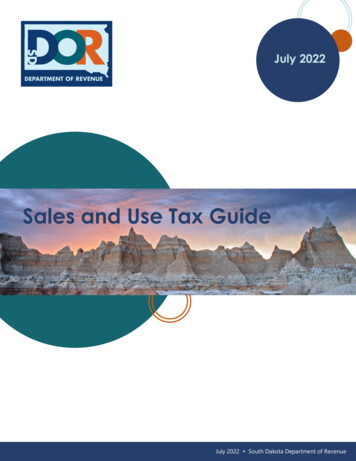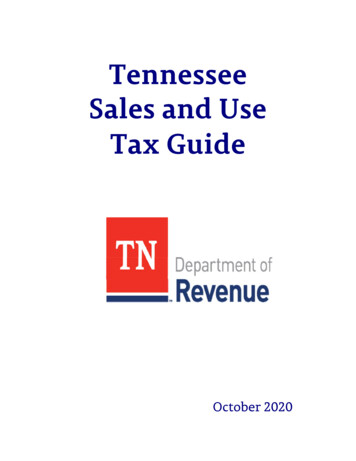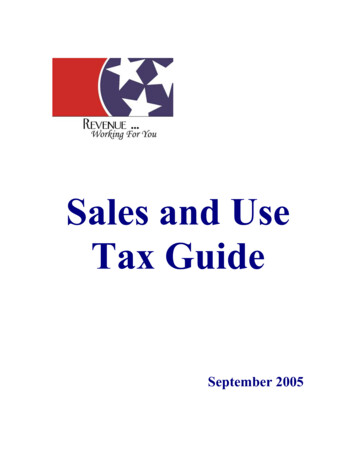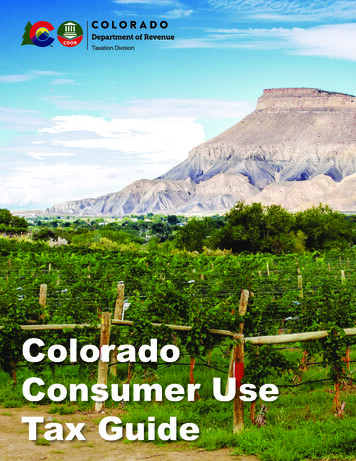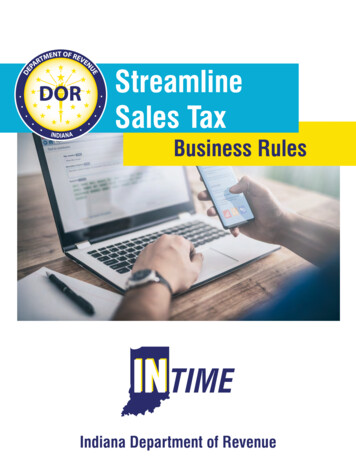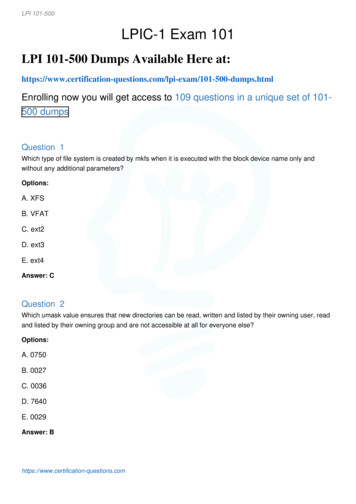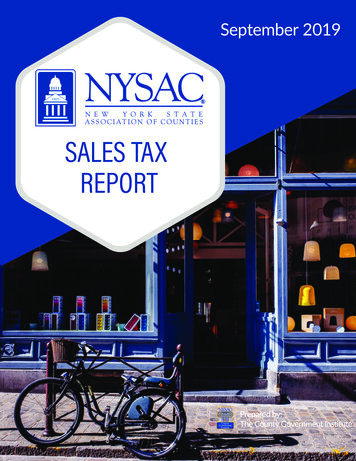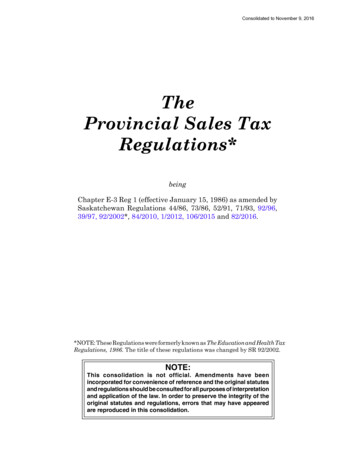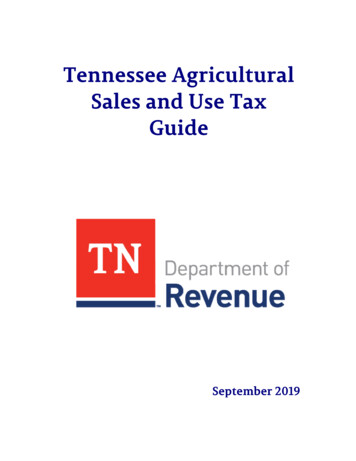
Transcription
Tennessee AgriculturalSales and Use TaxGuideSeptember 2019
SALES AND USE TAX APPLICATION TO FARMING, TIMBER HARVESTING, NURSERY OPERATIONS, AND AGRITOURISMDear Tennessee Taxpayer,This guide is designed to help farmers, timber harvesters, nursery operators, and dealers fromwhom they buy, to understand the scope of exemptions and reduced rates, the purchases thatremain taxable, and how to effectively administer these tax provisions.The information provided is general in nature. The excerpts from the sales tax law are through the2019 legislative session. The opinions expressed here are informal and do not constitute a revenueor letter ruling pursuant to the provisions of Tennessee Code Annotated § 67-1-109. Futureamendments, court decisions, regulation changes, or other factors could change the opinionsexpressed herein.If you have any questions, please visit www.TN.gov/Revenue. Click on “Revenue Help” to findhundreds of frequently asked questions and answers! You can also submit a question for emailresponse if you are unable to locate your answer or if the question involves a tax account matter.We also offer telephone assistance from 7:00am to 5:00pm, Central time, each business day. Ourmain office address and telephone numbers are as follows:Tennessee Department of RevenueTaxpayer Services DivisionAndrew Jackson Building500 Deaderick StreetNashville, TN 37242Toll-Free: (800) 342-1003Out-of-State: (615) 253-0600TDD: (615) 741-7398The locations and addresses of each of our regional offices are provided below. For yourconvenience, you may wish to call or send correspondence via email as described above since mostissues can be resolved by telephone or email.Regional OfficesKnoxville7175 Strawberry Plains PikeSuite 209Knoxville, TN 37914Chattanooga1301 Riverfront ParkwaySuite 203Chattanooga, TN 37402Johnson City204 High Point DriveJohnson City, TN 37601JacksonLowell Thomas State Office Building225 Dr. Martin L. King Jr. DriveSuite 340Jackson, TN 38301Memphis3150 Appling RoadBartlett, TN 381332
SALES AND USE TAX APPLICATION TO FARMING, TIMBER HARVESTING, NURSERY OPERATIONS, AND AGRITOURISMTable of ContentsAgricultural Exemptions4Qualification for Agricultural Exemptions5Application for the Agricultural Exemption Certificate6Exemption from Sales and Use Tax of Agricultural Products by the Producer6Community Gardens7Agritourism7Value-added Products and Prepared Food8Agricultural Exemption Frequently Asked Questions9Important Notice #07-12, Farmers, Timber Harvesters, and Nursery Operators23Important Notice #07-13, Retailer’s Notice – Sales to Farmers,Timber Harvesters and Nursery Operators29Important Notice #07-19, County Clerk’s Notice – Sales to Farmers,Timber Harvesters and Nursery Operators31Important Notice #08-05 Agri-Sawdust & Coverings33Important Notice #14-05 Agricultural Unmanned Aircraft Systems34Important Notice #17-04, Agricultural Uses of Mowers35Farmers, Timber Harvesters, and Nursery Operators’ Application Form(Effective February 2017)37Farmers and Nursery Operator’s Exemption Certificate – Example403
SALES AND USE TAX APPLICATION TO FARMING, TIMBER HARVESTING, NURSERY OPERATIONS, AND AGRITOURISMTenn. Code Ann. § 67-6-207 was amended inJanuary of 2008, to provide new languageregarding farm equipment and machineryexemptions for farmers, timber harvesters,and nursery operators and to combine all ofthe exemptions under one section of the salesand use tax code.Also included in Tenn. Code Ann. § 67-6-207are the criteria required for a person toqualify as a farmer, timber harvester, ornursery operator for purposes of obtainingexemptions.Farmers, timber harvesters, and nurseryoperators must apply for a personalizedAgricultural Exemption Certificate that will beissued by the Department of Revenue in thename of the applicant and which must berenewed every four years. The qualificationsfor exemption and the application process arediscussed later in this guide.Effective January 1, 2020, Public Chapter 436expands the definition of “agricultural land”for purposes of the greenbelt designation toinclude two noncontiguous tracts of landwithin the same county totaling at least 15acres and separated only by a road, body ofwater or public or private easement. Hay wagons and silage wagons useddirectly and principally in producingagricultural and nursery products forsale; Grain bins and attachments thereto; Aircraft such as an ag-cat or othersimilar airplanes which are designed forcrop dusting purposes; Equipment used exclusively forharvesting timber; Trailers used to transport livestock, totransport farm products, nursery stock,or equipment, supplies or productsused in agriculture, or for otheragriculture purposes relating to theoperation and maintenance of a farm; Self-propelled fertilizer or chemicalapplication equipment used to spreadfertilizer or chemical to aid in theproduction of food or fiber for humanor animal consumption; Tender beds and spreader beds, even ifmounted on a truck; Systems for poultry environmentcontrol, feeding, watering, andconveying eggs; Parts and labor used in the repair ofexempt farm equipment andmachinery; Gasoline or diesel fuel used for“agricultural purposes” as defined inTenn. Code Ann. § 67-6-102. Diesel fuelincludes dyed diesel used in cutting andharvesting trees by qualified timberharvesters; Containers for farm products or plasticand canvas used in the care of plants orAgricultural Exemptions[Tenn. Code Ann. § 67-6-207]The sale at retail, lease, rental, use,consumption, distribution, repair, storage foruse, or consumption in this state of thefollowing tangible personal property isspecifically exempted from the tax imposedby this chapter when sold to a qualifiedfarmer, timber harvester, or nursery operator. Farm equipment or machinery,including all-terrain vehicles andagricultural unmanned aircraft systems,used directly and principally forproducing agricultural and nurseryproducts for sale;4
SALES AND USE TAX APPLICATION TO FARMING, TIMBER HARVESTING, NURSERY OPERATIONS, AND AGRITOURISMas a protective covering for agriculturalproducts; Livestock and poultry feeds, drugs usedfor livestock, and instruments used forthe administration of such drugs; Seeds, seedlings, plants grown fromseed, and cuttings that will producefood, fiber, or tobacco; Any substance used in the reproductionof livestock, including embryos andsemen; Agri-sawdust – sawdust, wood shavings,chips, and slabs; Water furnished by a utility district andused exclusively in a farming operation; Electricity, natural gas, and liquefiedgas, including propane and butane,used directly for producing food orfiber for human or animal consumptionor to aid in growing horticulturalproducts for sale; and Trucks, flat-bed trailers, and semitrailers that are used to transport farmproducts over the road to market, totransport machinery over the roadbetween farms, or to pick up and carrysupplies over the road to the farm; and Lawn mowers designed for residentialuse that are used 50% or more of thetime for non-agricultural purposes suchas mowing lawns and landscapedareas.Qualification for Agricultural ExemptionsAn applicant will qualify for exemption as afarmer, timber harvester, or nursery operatorif one or more of the following criteria aremet. The farmer, timber harvester, or nurseryoperator:Coal, wood, wood products, wood byproducts, or fuel oil used as energy fuelto produce food or fiber or nursery orgreenhouse products. Is the owner or lessee of agriculturalland from which 1,000 or more ofagricultural products were producedand sold during the year, includingpayments from government sources; Provides for-hire custom agriculturalservices of plowing, planting,harvesting, growing, raising orprocessing of agricultural products orfor the maintenance of agriculturalland; Is the owner of land that qualifies fortaxation under the provisions of theAgricultural Forest and Open SpaceLand Act of 1976;While not an all-inclusive list, items that donot qualify for the agricultural exemptioninclude but are not limited to: Materials that become real propertywhen installed, including gravel,concrete, building materials (excepttemporary fencing such as corralpanels and gates);Straw purchased from a supplier otherthan the agricultural producer;Fertilizer and pesticides used to aid thegrowth and development of seeds,seedlings, or plants. Also included aresolutions either specifically created ormixtures with pesticides for use as asoil conditioner; Clothing items;Automobiles and trucks as well asrepair parts and labor for theautomobiles and trucks;5
SALES AND USE TAX APPLICATION TO FARMING, TIMBER HARVESTING, NURSERY OPERATIONS, AND AGRITOURISM The person’s federal income tax returncontains one or more of the following:(a) Business activity on IRS Schedule F(Profit or Loss from Farming) or (b)Farm rental activity on IRS Form 4835; (Farm Rental Income and Expenses) orSchedule E (Supplemental Income andLoss); or issued by the Commissioner or a fullycompleted Streamlined Sales Tax Certificateof Exemption, which must include theexemption authorization number included onthe certificate issued by the Commissioner, toevidence qualification for the exemption.Persons making purchases exempt from taxunder this section shall keep records toestablish that the property qualifies for theexemption. The purchaser shall be liable fortax, penalty, and interest for making nonqualifying purchases without payment of tax.The person otherwise establishes to thesatisfaction of the Commissioner thatthe person is actively engaged in thebusiness of raising, harvesting orotherwise producing agriculturalcommodities as defined in Tenn. CodeAnn. § 67-6-301(c)(2).Exemption from Sales and Use Tax ofAgricultural Products Grown or Produced[Tenn. Code Ann. § 67-6-301]The gross proceeds derived from sales oflivestock, nursery stock, poultry, and otherfarm or nursery products, made in anycalendar year directly by a farmer or nurseryoperator, are exempt from the sales or usetax if 50% or more of the products sold aregrown or produced in the calendar year bythe farmer or nursery operator making thesale.Persons qualifying as manufacturers cannotalso qualify for the agricultural exemptioncertificate and vice versa.Application for the Agricultural ExemptionCertificatePersons seeking to become qualified farmers,timber harvesters, or nursery operators mustsubmit an application for the agriculturalcertificate of exemption to the TennesseeDepartment of Revenue. This applicationrequires such information as theCommissioner deems necessary to determinewhether or not the exemption is applicable. Ifthe Commissioner finds that the applicant isentitled to be a qualified farmer, timberharvester, or nursery operator, theCommissioner will issue a certificate grantingsuch authority for a period of four years oruntil the applicant is no longer operatingwithin the scope of its original application.Any misrepresentation made on theapplication by the applicant will subject theapplicant to any applicable tax, penalty, andinterest.If less than 50% of the products being sold inany calendar year are grown or produced bythe farmer or nursery operator, then only thegross proceeds of sales of the productsactually grown or produced by such farmer ornursery operator are exempt from the salesor use tax.Generally, when sales of livestock, nurserystock, poultry, or other farm or nurseryproducts are made to consumers, other thanas described here, they are not exempt fromthe sales or use tax. In other words, when afarmer sells farm products that the farmerproduced to a person who sells only productsgrown by others, such as a grocery store, theresale by the grocery store of the farmproducts is subject to the sales or use tax.Persons who have obtained authority fromthe Commissioner to make purchases taxexempt as a qualified farmer, timberharvester, or nursery operator shall providetheir vendors with a copy of the certificateWhen livestock and livestock products, poultryand poultry products, or farm, nursery, andagricultural products are produced by a6
SALES AND USE TAX APPLICATION TO FARMING, TIMBER HARVESTING, NURSERY OPERATIONS, AND AGRITOURISMfarmer or nursery operator and used by thenursery operator or members of the nurseryoperator’s family, the sales or use tax lawstates specifically that Tennessee use tax doesnot apply.Community GardensEffective March 21, 2014, the sale of productsthat are grown or produced in a communitygarden in any calendar year are exempt fromsales tax when sold by a representative of thecommunity garden. [Tenn. Code Ann. § 67-6301(d)]When agricultural commodities sold byanyone other than the producer to a thirdparty who is purchasing to acquire rawproducts for use or for sale in the process ofpreparing, finishing, or manufacturing theagricultural commodities for retail sale to theultimate consumer, such sales are exemptfrom the sales or use tax, including paymentof the tax applicable to the sale, storage, use,transfer, or any other utilization or handling ofthe products.A “community garden” is defined in Tenn.Code Ann. § 43-24-102 as a piece of realproperty, either on vacant public land orprivate land, cultivated by residents of aneighborhood or community, or members ofa homeowners or condominium ownersassociation, for purposes of providingvegetables, nuts, herbs, fruit, or flowers,whether by means of cultivating annual,biennial, or perennial plants or trees, orhoney and honey byproducts, through theplacement and use of beehives, for use of theresidents of the neighborhood or communityor members of the homeowners orcondominium owners association.In such instances, the tax will be collected onthe sale of the agricultural commodities whenthey are actually sold as a marketable orfinished product to the ultimate consumer.The tax will be collected only once.For sales or use tax purposes, “agriculturalcommodity” means horticultural, poultry,farm products, livestock, livestock products,and harvested trees.AgritourismAgritourism is farm-based tourism wherevisitors are able to see and experience life inagricultural areas and participate in variousfarm activities. Agritourism activities mayinclude: assisting with farming tasks, pickingfruits and vegetables, visiting mazes cut incrop fields or “Halloween” mazes (includingHalloween-oriented activities and charactersin costume), horse riding, honey tasting,educational sessions, participation in hayrides (which may include picnics, campfires orbonfires, and entertainment such as musicand dancing), shopping in gift shops and farmstands for local and regional produce orhand-crafted gifts, and purchasing food andbeverages.Sales made directly from a farmer or nurseryoperator to a consumer through an onlinenonprofit farmers’ market are exempt fromsales or use tax providing that: An amount equal to the consumer’s fullpurchase price is transmitted by theconsumer or the online farmers’market to the farmer; and The cooperative or other organizingbody of the online farmers’ marketcharges no fee or other charge forfacilitating the sales other than “virtualbooth” rental fees assessed toparticipating farmers to cover actualcosts incurred in operating the onlinefarmers’ market. [Tenn. Code Ann. § 676-301(a)] If participants are charged admission toengage in such agritourism activities, thesecharges are generally subjectto sales tax. Tenn. Code Ann. § 67-6-212imposes sales taxes on fees or other chargesmade for admission to places of amusement,7
SALES AND USE TAX APPLICATION TO FARMING, TIMBER HARVESTING, NURSERY OPERATIONS, AND AGRITOURISMsports, entertainment, exhibition, display, orother recreational events or activities.Value-added Products and Prepared FoodSome farmers or growers will use agriculturalproducts grown by the farmer to make otherproducts known as “value-added” products.If the activities are only educational in nature(i.e., where guests are merely shown how afarm operates, are given demonstrations, etc.)without any amusement, recreation, orentertainment activities, such as horse ridingor hay rides, charges for these tours wouldnot be subject to the sales or use tax.For “value-added” products to be eligible forsale as tax-exempt farm products, the farmermust raise the products used to make thevalue-added product. Farm products may bepreserved and sold as tax-exempt as long asthe only non-raised ingredients added arepreserving additives such as water, sugar, salt,and pectin.If participants are permitted to pick fruits andvegetables for which an additional charge ismade, these sales would not be subject to thesales or use tax as long as the farm makingthe sale produces at least 50% of the productssold. However, when involved as a part of anamusement, entertainment, or recreationactivity, the charges for the fruits andvegetables must be made separately from thecharge for the amusement, entertainment, orrecreation event in order to qualify forexemption.Sometimes farmers and growers engaged inagritourism or similar activities will haveconcession stands at which the farmer will sellfood items prepared from agriculturalproducts grown by the farmer. If the foodproduct sold at concession is made entirelyfrom ingredients raised by the farmer, exceptfor the addition of water, sugar, salt, pectin, orother preservatives, it is considered a taxexempt farm product. However if anyingredient, other than water, sugar, salt,pectin, or other preservatives, that the farmerdid not raise is added to the food product, theentire sale is taxable.The farmer must collect tax on the sale ofproducts purchased from others and sold ifmore than 50% of the gross sales are from thesale of products produced by others.Generally, hand-crafted gifts would also besubject to the sales or use tax unless madefrom products produced by the farmer.If the person selling the agritourismadventure is not the owner or operator of thefarm, but has simply contracted with a farm toconduct such activities on the farm, then thetotal charge made by the seller for theadmissions to the amusement, entertainment,or recreation event and for sales of fruits andvegetables is subject to the sales or use tax.8
SALES AND USE TAX APPLICATION TO FARMING, TIMBER HARVESTING, NURSERY OPERATIONS, AND AGRITOURISMFor questions and answers regarding farm, nursery, timber harvesting, equipment, machinery, andrepair and replacement parts, refer to Tenn. Code Ann. § 67-6-207.Frequently Asked QuestionsAgricultural Exemption1a. What items are exempt from sales and use tax?Generally, the following items are exempt from sales and use tax when sold to qualified farmers,timber harvesters, or nursery operators. Farm equipment or machinery including all-terrain vehicles and agricultural unmannedaircraft systems used directly and principally for producing agricultural and nursery productsfor saleHay wagons and silage wagons used directly and principally in producing agricultural andnursery products for saleGrain bins and attachmentsAircraft designed and used for crop dustingEquipment used solely for harvesting timber (does not include trailers and trucks fortransporting)Livestock trailers along with trailers used to transport farm products, nursery stock, orequipment, supplies or products used in agriculture, or for other agriculture purposesrelating to the operation and maintenance of a farmWater furnished by a utility district and used exclusively in a farming operationSelf-propelled fertilizer or chemical application equipmentTender beds and spreader beds even if mounted on a truckSystems for poultry environment control, feeding, watering, and egg conveyanceReplacement parts and labor for exempt farm machinery and equipmentGas or diesel fuel used for agricultural purposes (does not include pre-mixed gas and oil ofone gal. or less)Seeds, seedlings, plants, fertilizer, and pesticides used to produce food or fiber, includingtobacco, for human or animal consumptionFarm containers and plastic or canvas covers used in raising plants, including tobacco, forhuman or animal consumptionFeed and drugs for livestock and poultry and instruments used for the administration ofsuch drugsAgri-sawdust, which includes sawdust, wood shavings, chips, and slabsElectricity, natural gas, liquefied gas, coal, wood, and fuel oil used in the production of foodand fiber for human or animal consumption or in the production of nursery and greenhousecrops1b. What items are not eligible for exemption? Clothing itemsAutomobiles, trucks, and repair parts and services for automobiles and trucksMaterials that become real property when installed, including gravel, concrete, buildingmaterials (excluding temporary fencing such as corral panels and gates)9
SALES AND USE TAX APPLICATION TO FARMING, TIMBER HARVESTING, NURSERY OPERATIONS, AND AGRITOURISM Trucks, flat-bed trailers, and semi-trailers that are used to transport farm products over theroad to market, to transport machinery over the road between farms, or to pick up and carrysupplies over the road to the farmLawn mowers designed for residential use that are used 50% or more of the time for nonagricultural purposes such as mowing lawns and landscaped areasStraw purchased from any supplier other than the agricultural producer2. I’ve heard that for an original purchase of farm equipment to be exempt, it must cost morethan 250. Do the repair part and/or labor on the farm machinery and equipment have to exceed 250 also?Machinery, equipment, and appliances do not have to cost 250 or more to be exempt farmmachinery or equipment. In addition, the charge for repair or replacement parts or repair labordoes not have to cost 250 to be exempt. However, the repair or replacement parts and repair labormust be for qualifying equipment and sold to a qualified farmer, timber harvester, or nurseryoperator.3. A seller charges purchasers for delivery of machinery and equipment to the farm, nursery, orforest. Is the delivery charge taxable?Delivery charges made by the seller are a part of the sales price of property regardless of whetherthe delivery charge is separately itemized on the invoice. If the machinery and equipment, repair orreplacement parts, or other items delivered qualify for an agricultural exemption, then the deliverycharge is equally exempt.4. How do the single article laws apply to a sale of a tractor and implement(s) included on thesame invoice?A single article is defined as one item of tangible personal property that is considered, by commonunderstanding, to be a separate unit, exclusive of any accessories or extra parts, and that is capableof being sold as an independent unit or a common unit of measure. The single article laws apply toeach single item of tangible personal property. A tractor and a farm implement (e.g., plow, rake,mower, or bucket, etc.) are commonly understood to each be a separate unit that is priced and soldas an independent item. State and local tax would be calculated separately for the tractor and foreach implement. The single article local tax limitation and the additional state single article tax arenot calculated on a total invoice amount for multiple articles of tangible personal property.Note that the single article law that treats parts and accessories installed on a motor vehicle as apart of the motor vehicle does not apply to tractors.5. I am not a farmer or nursery operator. Can I buy seeds, seedlings, and plants that produce foodor fiber for human or animal consumption free of tax?No. Tenn. Code Ann. § 67-6-207 limits the exemption from sales tax on agricultural purchases suchas seeds, seedlings, and plants to produce food or fiber for human or animal consumption only topurchases by persons that have qualified for and received the Agricultural Sales and Use TaxCertificate of Exemption.10
SALES AND USE TAX APPLICATION TO FARMING, TIMBER HARVESTING, NURSERY OPERATIONS, AND AGRITOURISM6. I am not a farmer, but, in the past, I have purchased items such as wood shavings and bales ofhay to use in my small horse stable and rabbit cages. Will I be able to purchase these itemswithout payment of sales tax?No. Persons that do not qualify as a farmers or nurserymen under Tenn. Code Ann. §67-6-207(e)cannot make tax-exempt purchases for agricultural purposes. Shavings and hay (usually wheatstraw) used for bedding or as absorbent materials continue to be subject to tax. These items arenot specified in the statute as exempt and do not fit within any of the categories of exempt items.7. My wife and I own a couple of horses stabled in another county. We ride only on the weekends.A couple of years ago, we bought a horse trailer tax-exempt. We are planning to buy anothertrailer next year. Will it be exempt?Only qualified farmers that have been issued the agricultural exemption certificate can buy thelivestock trailers exempt from the sales tax. Livestock trailers purchased by non-qualifying personsare subject to sales or use tax.8. I just paid 300 for tarpaulins and plastic to cover my round bales or hay stacked in a field. Canthose items be purchased tax-exempt?Yes. If purchased by a qualified agricultural certificate holder, plastic and canvas coverings, includingtarpaulins, can be purchased tax-exempt for use (1) in the care and raising of plants, seeds, orseedlings; (2) to cover agricultural and horticultural products, including hay; and (3) to cover a silo,grain bin, or other similar structure. .9. Are flat bed trailers used principally to transport seed, fertilizer, etc., to a farm, farmcommodities to a market; or farm equipment from one farm to another farm exempt from thesales tax as farm equipment?Yes. Trailers used to transport livestock, farm products, nursery stock, equipment, supplies, orproducts used in agriculture or for other agricultural purposes relating to the operation andmaintenance of a farm are specifically exempt as farm equipment and machinery.10. I am a qualified farmer, and I am buying corral panels. These come separately in 12-footlengths. The panels sell for 25 each. The gates come in 8-foot lengths and sell for 40 each. Thepanels and gates can be chained together. I buy the panels and gates separately according to theconfiguration that I need. Can the panels and gates be purchased tax-exempt?Yes. The portable corral panels and gates will qualify as appliances used directly and principally toproduce an agricultural product. Items do not have to meet a sales price threshold to qualify forexemption.11. Can a farmer or nursery operator buy a lawnmower that will be used to mow his or her lawntax exempt on an agricultural exemption certificate?No. However, if the lawn mower is directly used more than 50% of the time for agriculturalpurposes, the farmer or nursery operator may purchase the lawn mower tax-exempt on anagricultural exemption certificate. The Department may ask for additional information to verify thatthe mower meets the requirements for exemption. A farmer or nursery operator is responsible fortax, penalty, and interest on purchases that do not qualify for exemption.11
SALES AND USE TAX APPLICATION TO FARMING, TIMBER HARVESTING, NURSERY OPERATIONS, AND AGRITOURISM12. Can a nursery operator or sod farm purchase seeds used to grow sod sold by the nurseryoperator or sod farm exempt from sales tax on an agricultural exemption certificate?No. The exemption for seeds and seedlings in Tenn. Code Ann. § 67-6-207(a)(10) is for seeds,seedlings, and plants grown from seed and liners or cuttings, including tobacco, that will producefood or fiber for human or animal consumption. Although sod is an agricultural product exemptfrom sales tax when sold by the grower or producer, sod is not normally grown to produce food forconsumption by humans or animals.A nursery operator or sod farm can register for a Tennessee sales or use tax account and obtain aTennessee certificate of resale upon which such seed or seedlings can be purchased exempt fromsales tax as ingredients or components of a product to be sold to others. The nursery operator orsod farm, when completing the periodic Tennessee sales or use tax returns, will report sod sales asgross sales on Line 1 of the sales or use tax return and exempt the transactions by also reportingthem on Schedule A, Line 6.13. Can I purchase a farm truck exempt from sales or use tax?No. Trucks and automobiles are specifically listed in the statute as types of machinery that will notqualify for the exemption.14. I have a truck that is exclusively for farm use. Are the tires and/or other repairs on the truckexempt from sales tax?No. Tenn. Code Ann. § 67-6-207(a)(1) specifically provides that a truck is not farm equipment. Sincethe truck is subject to the sales tax, any tires, replacement parts, and labor performed on the truckare subject to the sales tax. The same answer applies to the trucks and trailers that loggers use toremove harvested timber from the forest.15. Is water used for agricultural purposes exempt from tax?Yes. If the water is furnished by a utility district and used exclusively in a farming operation then thewater is exempt from sales and use tax.12
SALES AND USE TAX APPLICATION TO FARMING, TIMBER HARVESTING, NURSERY OPERATIONS, AND AGRITOURISMATVs16. Previously, when I bought an ATV as farm equipment, I was required to pay the sales tax andpetition for a refund. Is this the current process?No. Farmers, nursery operators, and timber harvesters who have an agricultural exemptioncertificate may present the certificate to the dealer and purchase the ATV tax exempt. Theexemption is available only when the name on the billing and the title and registration is identical tothe name on the Agricultural Sales and Use Tax Certificate of Exemption.17. I have a “four wheeler” that qualifies as farm equipment. I am having it repaired. Is the repairexempt?Yes. The purchaser must present the agricultural exemption certificate to purchase the repair partsand repair labor for the qualified “fo
Knoxville, TN 37914 Chattanooga, TN 37402 Suite 340 Jackson, TN 38301 Johnson City Memphis 204 High Point Drive 3150 Appling Road Johnson City, TN 37601 Bartlett, TN 38133 . SALES AND USE TAX APPLICATION TO FARMING, TIMBER HARVESTING, NURSERY OPERATIONS, AND AGRITOURISM . Agricultural Sales and Use Tax Guide .
